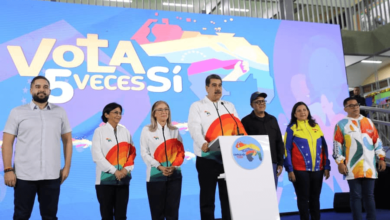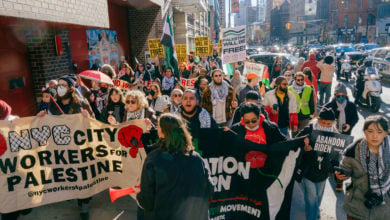The Venezuelan revolution is at a very important stage. It is a period that is defined by a sharpening of class struggle—when the opposing class forces that still exist in Venezuela are clashing. The clashes have already been violent and may become more so.
The sharpening class conflict comes from the revolution’s process of consolidation. In two weeks—on Dec. 2—there
 |
Opposition to Hugo Chávez and the consolidation of the revolution is mounting in two directions. Students from some of the more privileged universities are rallying in the streets. These students are closely linked to the established opposition in Venezuela—the same opposition that tried to stage a coup against Chávez five years ago, and protested on behalf of the right-wing RCTV when its license was not renewed over the summer.
In some ways, this opposition does not in itself constitute a major threat. Over and over again, the millions of poor and working people in Venezuela have proven that they are more organized and more cohesive than the discredited elite. These right wingers have a clear tradition of losing. They lost their coup attempt, they lost their oil shutdown in 2002, they lost their referendum to force Chávez out in 2005 and they lost the presidential election in 2006.
There is every reason to believe that they are headed to a loss again at the polls on Dec. 2.
Reactionary defectors
What is more significant is the deepening polarization within the traditionally pro-Chávez camp. One sector of the movement that has up until this point supported the Bolivarian revolution is defecting to the side of the opposition.
The most notable defection is that of Gen. Raul Baduel, who announced on Nov. 5 that he would join the opposition call to vote “no” in the constitutional referendum. In a veiled appeal to anti-Chávez elements within the armed forces, he called on soldiers to “carefully study” the proposed changes. Baduel made his comments at a press conference to which only the opposition, big-business media were invited.
Baduel’s comments would be characteristic of the head of a business federation or one of the plotters of the 2002 coup. But Baduel had been with Chávez since the 1970s. He was one of the original signers of the 1982 declaration of the MBR-200, the movement within the military that led Chávez’s rise to the presidency. Baduel was also an important figure in winning military support to turn back the 2002 coup attempt—and was featured prominently in the film “The Revolution Will Not Be Televised.” After Chávez was restored, Baduel became the head of the Venezuelan armed forces.
So what happened? Why is a formerly solid Chávez ally now being referred to by Chávez and millions of Venezuelans as a traitor?
It has to do with the fact that the movement that brought Chávez to power was a multi-class movement. Of course, there were forces that wanted to make a revolution that really benefited the working class and ultimately aimed to bring it to power. But there were others that were still committed to capitalist development, who supported the Bolivarian Revolution because they wanted more independence for Venezuelan capitalists from U.S. imperialism.
Baduel stepped down as the head of the armed forces in July. At that time, he gave a speech where he made clear that those two trends were no longer “peacefully coexisting.” He warned against what he called then “Marxist orthodoxy” in the new measures being proposed. He didn’t speak in the name of counterrevolution, but in the name of “21st Century Socialism.”
When Baduel stepped down in July, Gustavo Rangel replaced him. Rangel had previously been in charge of organizing the people’s militias—the new state apparatus that is growing up alongside the traditional military. It was a sign that the class orientation of the revolution is becoming more defined in favor of the working class and socialists.
Baduel’s open alignment with the opposition raises the question of how strong the non-revolutionary wing is within the traditional armed forces. Although Chávez has repeatedly assured the world that there is no current strong enough to stage a coup, the revolutionary elements in Venezuela are certainly preparing for a fight.
Support the revolution
The U.S. and Venezuelan corporate media are whipping up opposition to the constitutional reforms on the grounds that they represent a step toward “dictatorship”—a term they use whenever their allies are not in power.
The media have focused on the fact the new constitution would eliminate presidential term limits. This reform, which does not by any means eliminate presidential elections themselves, is already in place in France, Italy, England, Japan and Australia. In contrast, the corporate media refers to these U.S. allies as shining examples of democracy.
The constitutional changes would also increase the power of the central government in a number of areas, including the central bank. These reforms strengthen the hand of the revolutionaries who have the most power in the central government. The political power of the old ruling class is primarily based in pockets of old corrupt municipal power blocs. The new constitution would similarly foster the development of communal councils, which pose a direct threat to the croneyism of traditional ruling class politics.
A brief look at the constitutional reforms shows that they in fact strengthen people’s power. It is those provisions that have the propertied classes so fearful, combined with the possibility that the revolutionaries will keep the presidency for long enough time to consolidate these gains.
The new constitution gives the government greater authority to confiscate private property on the basis of “public benefit or social interest.” The people’s militias would gain new prominence and official recognition.
The new constitution would lessen the official workday to six hours. In addition, new resources and recognition would be extended to the Afro-Venezuelan and Indigenous communities.
The threat of a U.S.-orchestrated coup is still very real.
The private university student protests and especially the Baduel defection came just after a meeting between the Venezue-lan opposition and top U.S. government representatives in Prague in October.
Their scenario is clear: try to create chaos in the streets, use student demonstrations and artificial shortages to stir dissent and confusion and then appeal to elements in the army to “restore order.” It is a play the CIA has run many times before.
In October, for example, pro-Chávez activists supposedly killed a student activist. The story proved to be entirely false after it had already circulated worldwide. The same scenario played out during the 2002 coup when the media ran the same false line about Chávez militants shooting “peaceful demonstrators.”
As the crisis heats up in Venezuela, revolutionary socialists and progressives in this country need to be prepared to expose the propaganda and support the Venezuelan revolution—through thick and thin.






